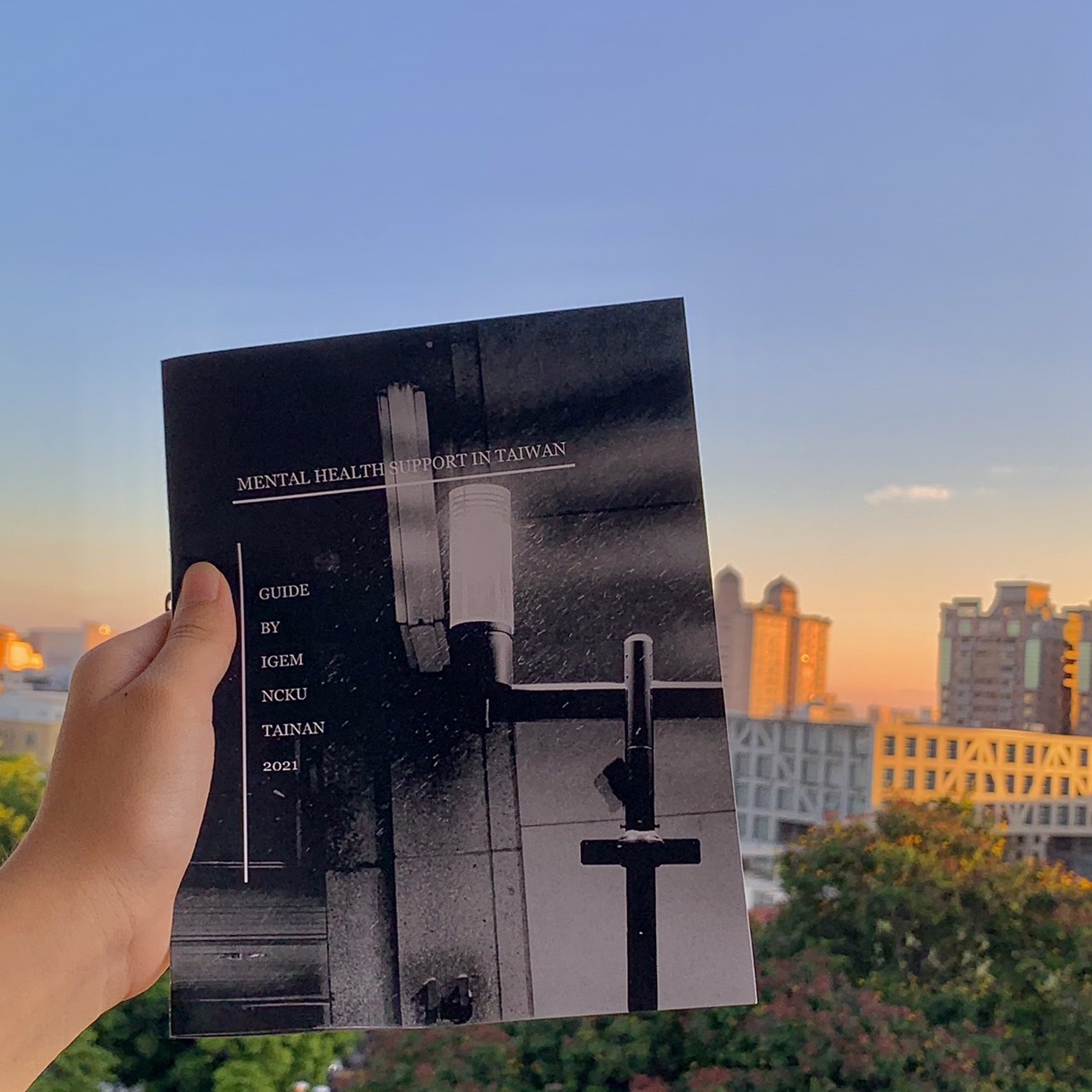Minghan1005 (Talk | contribs) |
Minghan1005 (Talk | contribs) |
||
| Line 40: | Line 40: | ||
<div align="center"><button type="submit" style="background-color:#6A8DC3;color:#FFFAF4; border: 1px #F4DBB2;font-weight: bold;"class="font-size-m">booklet link</button></div> | <div align="center"><button type="submit" style="background-color:#6A8DC3;color:#FFFAF4; border: 1px #F4DBB2;font-weight: bold;"class="font-size-m">booklet link</button></div> | ||
</form> | </form> | ||
| − | + | ||
<p> By chance, we found Momentizing, an international mental health organization based in Taiwan which provides educational mental health content and counseling service by professionals in English/Indonesian. The Founder of Momentizing, Ms. Estralita Gracia, is an Indonesian psychologist who aspires to reach out to the global community through inclusivity and caring. Without giving much thoughts, we invited her to an online interview session to develop better understanding about expat depression. During the session, she shared abundant information and experiences from an expatriate psychologist perspective. Apart from that, she also mentioned several pieces of advice on handling stress and breaking the cycle of stress becoming depression. The interview was recorded and uploaded on our Instagram, reaching hundreds of people. We sincerely appreciate Momentizing and Ms. Estralita Gracia for accepting our request, another step towards a caring and highly inclusive global community.</p> | <p> By chance, we found Momentizing, an international mental health organization based in Taiwan which provides educational mental health content and counseling service by professionals in English/Indonesian. The Founder of Momentizing, Ms. Estralita Gracia, is an Indonesian psychologist who aspires to reach out to the global community through inclusivity and caring. Without giving much thoughts, we invited her to an online interview session to develop better understanding about expat depression. During the session, she shared abundant information and experiences from an expatriate psychologist perspective. Apart from that, she also mentioned several pieces of advice on handling stress and breaking the cycle of stress becoming depression. The interview was recorded and uploaded on our Instagram, reaching hundreds of people. We sincerely appreciate Momentizing and Ms. Estralita Gracia for accepting our request, another step towards a caring and highly inclusive global community.</p> | ||
<br> | <br> | ||
| Line 46: | Line 46: | ||
<div align="center"><button type="submit" style="background-color:#6A8DC3;color:#FFFAF4; border: 1px #F4DBB2;font-weight: bold;"class="font-size-m"> audio play like the one in education part</button></div> | <div align="center"><button type="submit" style="background-color:#6A8DC3;color:#FFFAF4; border: 1px #F4DBB2;font-weight: bold;"class="font-size-m"> audio play like the one in education part</button></div> | ||
</form> | </form> | ||
| − | + | ||
<h2 align="left" style="margin-bottom: 1rem; color:#172544">References</h2> | <h2 align="left" style="margin-bottom: 1rem; color:#172544">References</h2> | ||
Revision as of 07:02, 11 October 2021

Inclusivity
As a team with diverse backgrounds, iGEM NCKU_Tainan recognizes the importance of diversity and inclusion. During the beginning of the season, we did a lot of research on depression and mental health related issues. Among many causes and types of depression, there is one which caught our eyes: Expat depression. The descriptions of expat depression listed online were ambiguous and varied, but the general sentiment seemed to fit: “Feelings of severe and sustained despondency and dejection experienced while living abroad”. According to a new research report published by Finaccord[1], the total number of expatriates worldwide amounted to around 66.2 million in 2017. This figure has grown at a compound annual rate of 5.8% since 2013, given that there were around 52.8 million expatriates in that year. By 2021, Finaccord forecasts that the number will reach around 87.5 million. A counselor based in Spain, Chris Neill, states[2], “The rates of depression could be up to 50 percent higher among expats”.
As some of our members are expatriates in Taiwan, they agreed that this is a valid struggle experienced by many of them. Language barrier, culture shock, homesickness, unfamiliarity, expat stress are just a part of the struggles faced by them. Thus, our team aspires to cater mental health support for foreign nationals in Taiwan.
Many foreign nationals do not understand how to seek professional mental help in Taiwan. Generally, language barrier would come off as the main issue in seeking help for them. Not to mention, communication plays a major part in mental health consultation. This part alone is crucial enough to affect expatriates’ consideration when looking for professional help. Hence, to address this issue, we were inspired to create a booklet which served as a guide providing them information about the mental health community and professionals that provide English services.
We kept the design simple and easy to understand without complicated phrases so people from different levels of education can digest the information easily. Even among expatriates, English might not be their first language. That is why keeping it simpler is better. Since we planned to distribute our booklets in our university, the choice of languages should be taken into consideration. While not exerting too much additional effort, we also provided the booklet in other languages, such as Chinese and Indonesian. In National Cheng Kung University, Indonesians made up a considerable number of the international students, one of the most familiar targeted groups in our surroundings.
The booklet was later distributed to various university organizations and international student associations. Due to the pandemic, many international students could not return to their home countries during the summer break. So, we also distributed the booklets in dormitories, hoping to reach our target audiences and cater to anyone who needs it. Small actions can make a big difference, but of course we hope no one would ever need it.
 |
 |
By chance, we found Momentizing, an international mental health organization based in Taiwan which provides educational mental health content and counseling service by professionals in English/Indonesian. The Founder of Momentizing, Ms. Estralita Gracia, is an Indonesian psychologist who aspires to reach out to the global community through inclusivity and caring. Without giving much thoughts, we invited her to an online interview session to develop better understanding about expat depression. During the session, she shared abundant information and experiences from an expatriate psychologist perspective. Apart from that, she also mentioned several pieces of advice on handling stress and breaking the cycle of stress becoming depression. The interview was recorded and uploaded on our Instagram, reaching hundreds of people. We sincerely appreciate Momentizing and Ms. Estralita Gracia for accepting our request, another step towards a caring and highly inclusive global community.
References
- Finaccord - Global Expatriates: Size, Segmentation and Forecast for the Worldwide Market. Finaccord.com. Published 2017. Accessed October 9, 2021. https://www.finaccord.com/Home/About-Us/Press-Releases/Global-Expatriates-Size,-Segmentation-and-Forecas
- Life in Mérida. Life in Merida. Published February 9, 2021. Accessed October 9, 2021. https://lifeinmerida.com/what-is-expat-depression/#Why_do_mental_health_issues_affect_expats

